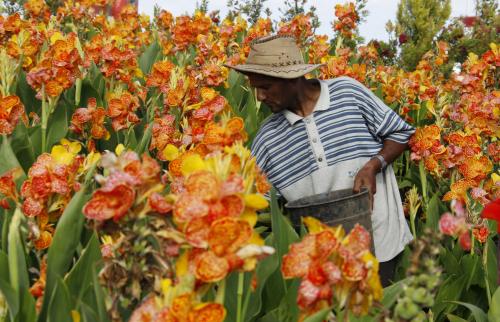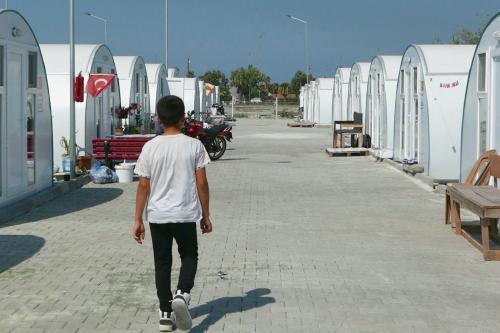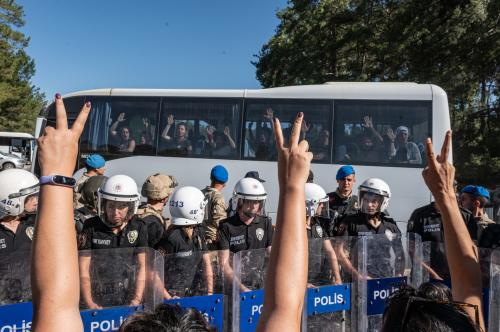The speed at which Syria’s humanitarian crisis is unfolding is breathtaking. In the space of 18 months, Lebanon’s refugee population increased from 2,000 to over 500,000 – and this in a country with a population of 4 million. Refugees continue to pour across the borders (where they are still able to do so), the international community is mobilizing funds and redeploying staff to the region, and delegations of all sorts are turning up daily in neighboring countries. There is no end in sight to the conflict which has already uprooted over 6 million Syrians – one in three of the country’s pre-crisis population. In fact, on a recent trip to the region, everyone we talked with believed that the humanitarian situation would only get much worse.
Governments in the region, international agencies and local civil society groups are all running at full speed to try to keep up with the current challenges. But the Syrian crisis raises some fundamental questions for the humanitarian community which deserve some reflection – even in the midst of the urgency to respond.
- How do we protect asylum space? Presently, the Lebanese border is open to all Syrian refugees. Until May, the Jordanian border was largely open to Syrians (except for restrictions upon single young men and Palestinians), although since then, it appears that the government has limited the number of Syrians allowed to enter the country. The Turkish government ‘manages’ its border, limiting the number of Syrian refugee arrivals in accord with camp capacity. The Iraqi border is closed. Even though these governments are not signatories to the 1951 UN Refugee Convention (except for Turkey, although it maintains a restriction allowing only Europeans to be considered refugees), permitting desperate Syrians to cross one’s border in search of protection is the right thing to do. Governments in the region deserve the support and gratitude of the international community. But that only goes so far. As my colleague Kemal Kirişci has written, the Turkish government is growing weary of expressions of appreciation and wants more tangible (i.e. financial) support. Countries hosting refugees are bearing a tremendous burden with mounting economic, social, political and security concerns. Beyond expressions of appreciation and financial support, how can the international community support host governments to allow Syrian refugees to remain? Is it just the responsibility of the humanitarian agencies? What about international financial institutions?
- Is it time to reconsider the question of camps for refugees? For the past decade or so, the international community seems to have adopted the mantra that people are better off living in host communities than in refugee camps. Refugee camps have gotten a bad reputation as places of insecurity, dependency and de-humanization. But camps provide necessary services to people in need. Even Za’atari camp in Jordan (which is an awful place) provides food, water, health care and shelter – largely in line with international standards. Camps also provide accountability. If a camp fails to provide health care to its residents, it’s clear who is to blame. If a Syrian refugee living in an abandoned building can’t access a Lebanese hospital, it’s less clear who is responsible. The refugee may not know where to go or be unable to pay the bill or the bus fare to get there or be afraid to even leave the apartment. Camps also provide visibility; they are more accessible to media and visiting delegations. Host governments can point to a camp and say ‘look what we’re doing.’ It’s more difficult to be reminded of the burden posed by refugees when they are living in hundreds of different places. In the case of Lebanon where refugees are presently dispersed in more than 1400 sites – many of which are clearly sub-standard — camps are probably a better solution for most, certainly for those living in ‘informal tented settlements’ as they are euphemistically called. Not only would camps make it easier for international agencies to provide services, but they would be a visible reminder of the refugees’ presence in Lebanon. It is simply easier to get media coverage when there is a refugee camp to visit than when it’s necessary to seek out individual refugee families living in abandoned buildings or in six-story walk-up apartment buildings.
- How can the civilian nature of refugee camps be maintained? It is no secret that the Free Syrian Army uses Za’atari refugee camp in Jordan for recruitment, medical care and R&R for its soldiers. Nor is it a secret that criminal gangs exercise powerful influence over the camp’s economic life and that camp residents sometimes threaten staff. A recent report noted that even the Jordanian teachers don’t feel safe in Za’atari classrooms. Everyone seems to recognize the urgent need for increased security in the camp – both for residents and for staff – but there are no easy answers. Dislodging powerful interests that have become entrenched is difficult and dangerous; the commitment of the Jordanian government and police is urgently needed. While it’s perhaps easy for an outsider to conclude that the present situation is unacceptable, it is also important to underscore that the negative consequences of a lack of security in Za’atari extend far beyond Jordan’s borders – particularly for governments which are considering establishing camps. What government in its right mind would want another Za’atari on its territory?
- Is it time to reconsider the word ‘host?’ When governments allow refugees to enter their territory, it’s fair to refer to them as ‘host governments’ (although the phrase doesn’t work for those displaced within their country’s border.) But the term ‘host communities’ is more problematic. If you think about it, the word ‘host’ implies both choice and hospitality. To use a personal example, I host people for dinner – I’ve invited them, I’m glad to have them in my home. I hosted my cousins visiting Washington last year – they said they’d like to come and I was delighted to have them for a few days (but note that both my dinner guests and my cousins did leave after enjoying my hospitality.) For communities in Lebanon and Jordan, there is often neither choice nor hospitality. Refugees arrive in Lebanese villages and Jordanian communities without having been invited by those communities, and while many – perhaps most – were initially received with great hospitality, the welcome is wearing thin. The refugees can’t go home and there is uncertainty over when they will be able to leave. The term ‘host community’ seems to imply a positive reception of the refugees — or at least a tolerance of their presence — which shouldn’t be assumed, particularly as time goes by. The term ‘affected community’ is perhaps more accurate.
- Finally, how do we recognize the security implications posed by the presence of refugees while continuing to affirm their basic rights? I’ve always resisted arguments that refugees are responsible for the spread of violence across borders. For example, in spite of the many dire predictions that Iraqi refugees would bring turmoil to the countries where they sought protection, this didn’t happen. Lebanon, on the other hand, worries me. The arrival of over 500,000 Syrian Sunni refugees in a country with a population of 4 million and an unstable government is a security threat. There have been rockets launched from Syria into Hezbollah territory, there are almost daily armed skirmishes in Tripoli and last week, new outbreaks of fighting occurred in Sidon. In at least some cases, this fighting has included newly-arrived Syrians in the country. Perhaps these incidents would have all occurred without the presence of the refugees, but the growing number of Syrians in Lebanon is definitely causing tension – between refugees and the communities where they are living; between supporters and opponents of the Assad regime; and between Lebanese sectarian groups and their militias. This affects Lebanon’s political future but also affects the Syrian refugees who left Syria to escape armed conflict. There are troubling reports of Syrian refugees in Lebanon who have been displaced two or three times by the violence taking place in their country of refuge.
The Syrian displacement crisis raises more than five difficult questions for the humanitarian community. In my next blog, I consider an additional five uncomfortable questions.



Commentary
The Syrian Humanitarian Crisis: Five Uncomfortable Questions for the International Community
July 8, 2013